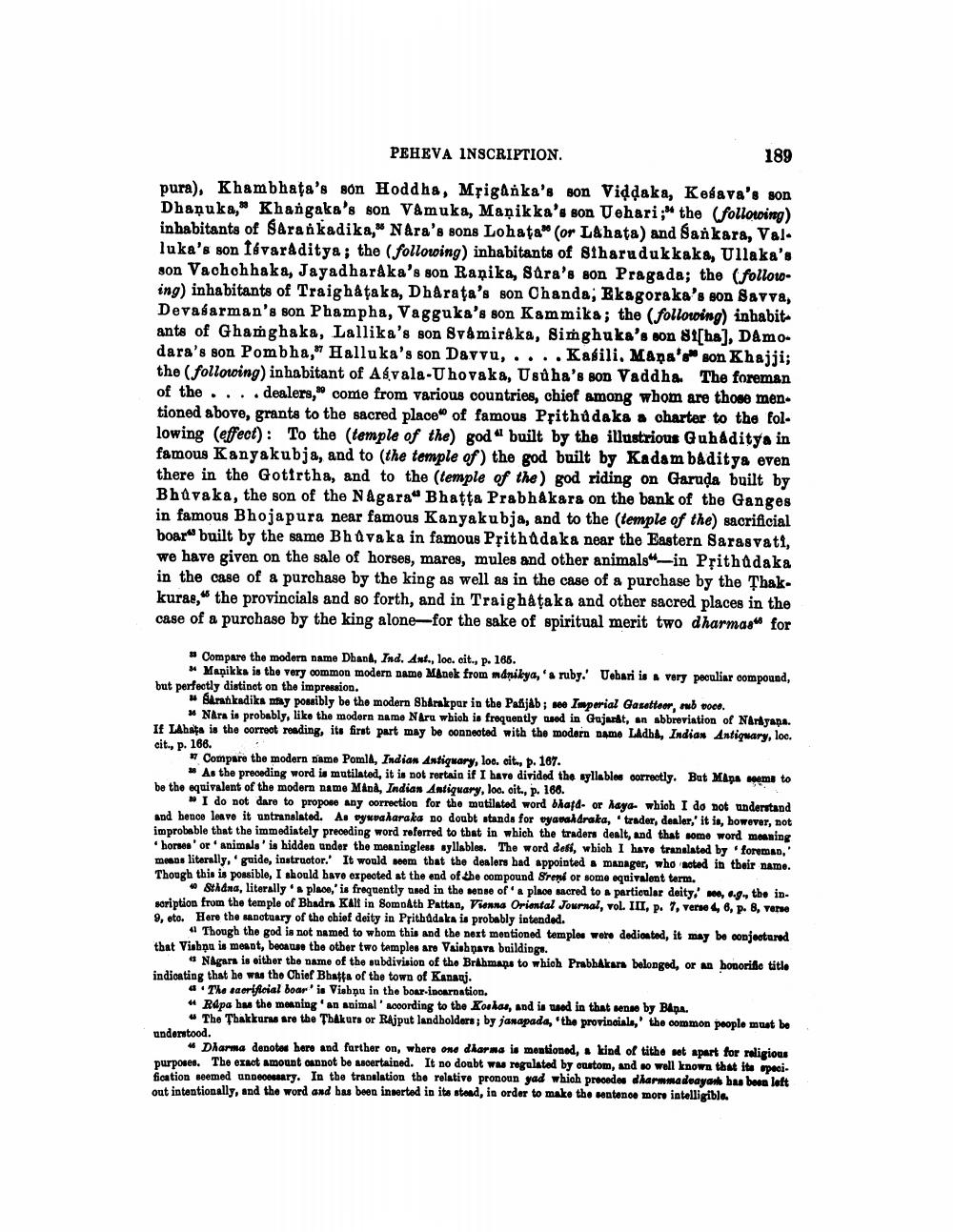________________
PEHEVA INSCRIPTION.
189
pura), Khambhats's son Hoddha, Mrigaska's son Viddaka, Kedava's son Dhanuka, Khangaka's son Vamuka, Manikka's son Uehari," the following) inhabitants of Sarankadika," Nara's sons Lohata" (or L&hata) and Sankara, Valluka's son évar&ditys; the (following) inhabitants of 8tharudukkaka, Ullaka's son Vachehhaka, Jayadharaka's son Rapika, Sara's son Pragada; the (following) inhabitants of Traighataka, Dharata's son Chanda; Ekagoraka's son Savva, Devafarman's son Phampha, Vagguka's son Kammika; the (following) inhabit ants of Ghamhghaks, Lallika's son Svåmiráka, Bimghuka's son 81[ha], Damo dara's son Pombha," Halluka's son Davvu, . . . . Kasili. Mana's son Khajji; the (following) inhabitant of Asvala-Uhovaka, Usuha's son Vaddha. The foreman of the....dealers," come from various countries, chief among whom are those men. tioned above, grants to the sacred place of famous Prithůdaka a charter to the following (feet): To the (temple of the) god built by the illustrious Guhaditya in famous Kanyakubja, and to (the temple of) the god built by Kadam båditys even there in the Gotirtha, and to the (temple of the) god riding on Garuda built by Bhuvaka, the son of the Nagara" Bhatta Prabhakara on the bank of the Ganges in famous Bhojapura near famous Kanyakubja, and to the (temple of the) sacrificial boar built by the same Bhavaka in famous Prithadaka near the Eastern Sarasvati, we have given on the sale of horses, mares, mules and other animals"-in Prithûdaka in the case of a purchase by the king as well as in the case of a purchase by the Thakkurae," the provincials and so forth, and in Traighâtaka and other sacred places in the case of a purchase by the king alone-for the sake of spiritual merit two dharmas" for
Compare the modern name Dhand, Ind. Ant., loc. cit., p. 165.
Manikka is the very common modern name Manek from manikya, 'a ruby.' Uehari is a very peculiar compound, but perfectly distinct on the impression.
Sarankadika may possibly be the modern Sharakpur in the Pañjab; see Imperial Gazetteer, sub voce.
34 Nara is probably, like the modern name Naru which is frequently used in Gujarat, an abbreviation of Narayana. If Lahata is the correct reading, its first part may be connected with the modern name Ladha, Indian Antiquary, loc. cit., p. 166.
Compare the modern name Pomla, Indian Antiquary, loc. cit., p. 167.
As the preceding word is mutilated, it is not rertain if I have divided the syllables correctly. But Mapa seems to be the equivalent of the modern name Manà, Indian Antiquary, loc. cit., p. 166.
I do not dare to propose any correction for the mutilated word bhatd- or haya- which I do not understand and hence leave it untranslated. As vyuvaharaka no doubt stands for vyavaháraka, trader, dealer,' it is, however, not improbable that the immediately preceding word referred to that in which the traders dealt, and that some word meaning horses' or animals' is hidden under the meaningless syllables. The word desi, which I have translated by foreman, means literally, guide, instructor. It would seem that the dealers had appointed a manager, who acted in their name. Though this is possible, I should have expected at the end of the compound Srent or some equivalent term.
40 Sthana, literally a place,' is frequently used in the sense of a place sacred to a particular deity,' see, eg, the inscription from the temple of Bhadra Kalf in Somnath Pattan, Vienna Oriental Journal, vol. III, p. 7, verse 4, 6, p. 8, verse 9, eto. Here the sanctuary of the chief deity in Prithadaka is probably intended.
41 Though the god is not named to whom this and the next mentioned temples were dedicated, it may be conjectured that Vishnu is meant, because the other two temples are Vaishnava buildings.
Nagara is either the name of the subdivision of the Brahmans to which Prabhakara belonged, or an honorific title indicating that he was the Chief Bhatta of the town of Kanauj.
a The sacrificial boar is Vishnu in the boar-incarnation.
Rapa has the meaning ' an animal' according to the Koskas, and is used in that sense by Bapa.
The Thakkuras are the Thakurs or Rajput landholders; by janapada, 'the provincials, the common people must be
understood.
Dharma denotes here and farther on, where one dharma is mentioned, a kind of tithe set apart for religious purposes. The exact amount cannot be ascertained. It no doubt was regulated by custom, and so well known that its specification seemed unnecessary. In the translation the relative pronoun yad which precedes dharmmadeayam has been left out intentionally, and the word and has been inserted in its stead, in order to make the sentence more intelligible.




